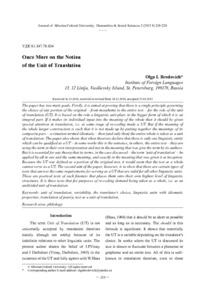Показать сокращенную информацию
Once More on the Notion of the Unit of Translation
| Автор | Brodovich, Olga I. | en |
| Автор | Бродович, О.И. | ru_RU |
| Дата внесения | 2015-02-27T03:10:01Z | |
| Дата, когда ресурс стал доступен | 2015-02-27T03:10:01Z | |
| Дата публикации | 2015-02 | |
| URI (для ссылок/цитирований) | https://elib.sfu-kras.ru/handle/2311/16669 | |
| Аннотация | The paper has two main goals. Firstly, it is aimed at proving that there is a single principle governing the choice of any portion of the original – from morpheme to the entire text – for the role of the unit of translation (UT). It is based on the role a linguistic unit plays in the bigger form of which it is an integral part. If it makes its individual input into the meaning of the whole then it should be given special attention in translation, i.e. at some stage of re-coding made a UT. But if the meaning of the whole larger construction is such that it is not made up by putting together the meanings of its composite pars – a situation termed idiomatic – then (and only then) the entire whole is taken as a unit of translation. The paper also shows that when theorists declare that there is only one linguistic entity which can be qualified as a UT – in some works this is the sentence, in others, the entire text – they are using the term in their own interpretation and not in the meaning that was give the term by its authors. But it is essential for any theory that its terms, in the case discussed – the term ‘unit of translation’ – be applied by all in one and the same meaning, and exactly in the meaning that was given it at inception. Because the UT was defined as a portion of the original text, it would seem that the text as a whole cannot serve as a UT. The second aim of the paper, however, is to show that there are certain types of texts that answer the same requirements for serving as a UT that are valid for all other linguistic units. These are poetical texts of such fineness that places them onto their own highest level of linguistic structures. It is these texts that for purposes of re-coding demand being taken as a whole, i.e. as an undivided unit of translation | en |
| Аннотация | В статье рассматривается вопрос о принципе, на котором основывается выбор единицы перевода. Показывается, что ключевым в этом вопросе является наличие/отсутствие идиоматичности в отношениях между единицей того или иного уровня языковой структуры и той большей структурой, в которую рассматриваемая единица входит как составная часть. Если семантика более крупной структуры составляется из суммы смыслов образующих ее частей, то каждая такая часть подлежит отдельному отражению в переводе, то есть становится самостоятельной единицей перевода. Если же семантика включающей структуры оказывается чем-то бóльшим, чем простая сумма смыслов частей, то переводу подлежит именно эта включающая структура как единое целое. Существенно, что это оказывается справедливым для единиц всех знаковых уровней – от морфемы в составе слова до целого предложения. Особое внимание уделено возможности признания текста как единицы, подлежащей цельному переводческому решению. Показано, что и к тексту применимы те же критерии, которые определяют выбор менее крупных единиц перевода. Показано также, что текстами, которые могут и даже должны быть взяты как целое для перевода, являются поэтические тексты, но не любые, а лишь те, которые по своему значению являются чем-то качественно бóльшим, чем сумма смыслов составляющих их предложений | ru_RU |
| Язык | en | en |
| Издатель | Сибирский федеральный университет. Siberian Federal University. | ru_RU |
| Является частью серии | Журнал Сибирского федерального университета. Гуманитарные науки. Journal of Siberian Federal University. Humanities & Social Sciences;2015 8 (2) | en |
| Тема | unit of translation | en |
| Тема | variability | en |
| Тема | the translator’s choice | en |
| Тема | linguistic units with idiomatic properties | en |
| Тема | translation of poetry | en |
| Тема | text as a unit of translation | en |
| Тема | единица перевода | ru_RU |
| Тема | вариативность | ru_RU |
| Тема | переводческие решения | ru_RU |
| Тема | идиоматичность языковой структуры | ru_RU |
| Тема | текст как единица перевода | ru_RU |
| Тема | поэтический перевод | ru_RU |
| Название | Once More on the Notion of the Unit of Translation | en |
| Альтернативное название | Еще раз о единице перевода | ru_RU |
| Тип | Journal Article | |
| Тип | Published Journal Article | |
| Контакты автора | Brodovich, Olga I.:Institute of Foreign Languages 13, 12 Linija, Vasilievsky Island, St. Petersburg, 199178, Russia; E-mail: olgabrodovich@yandex.ru | en |
| Контакты автора | Бродович, О.И.:Институт иностранных языков Россия, 199178, Санкт-Петербург, 12 линия В.О., 13 | ru_RU |
| Страницы | 218-228 |

